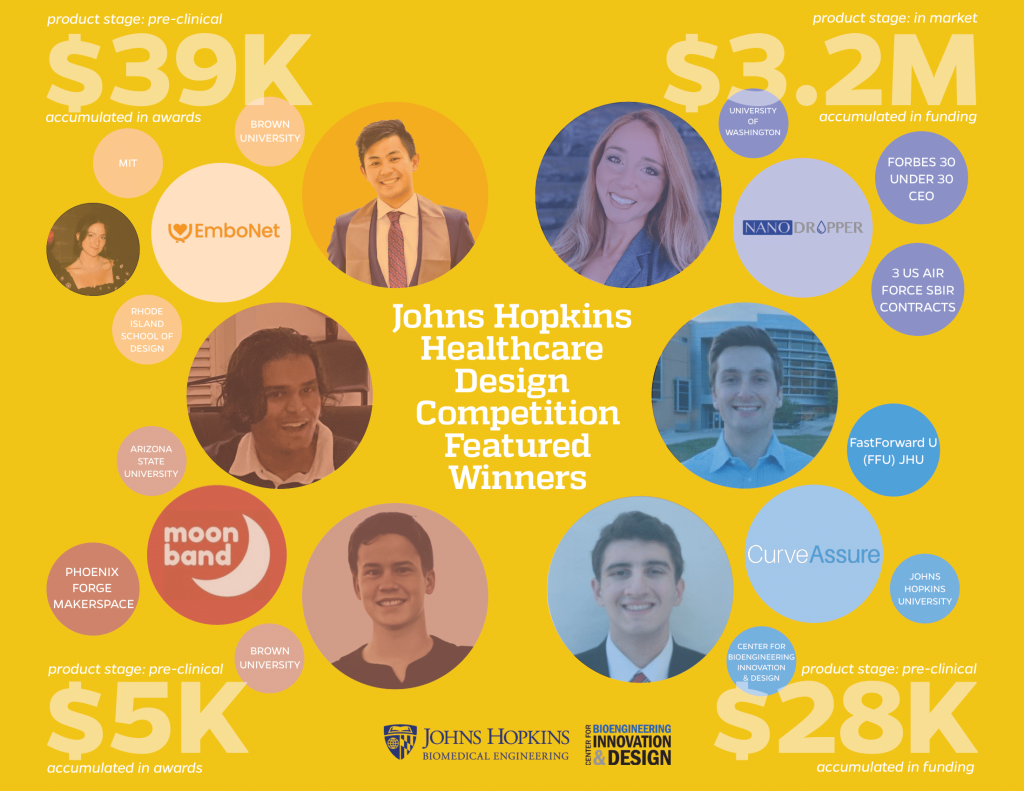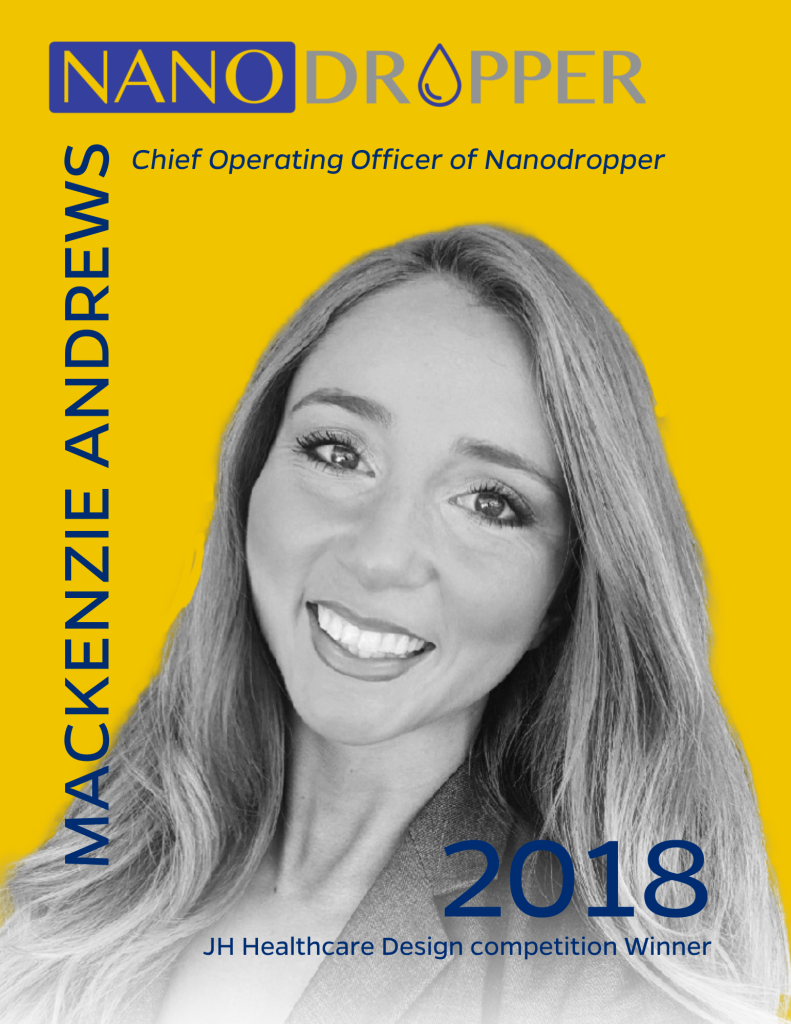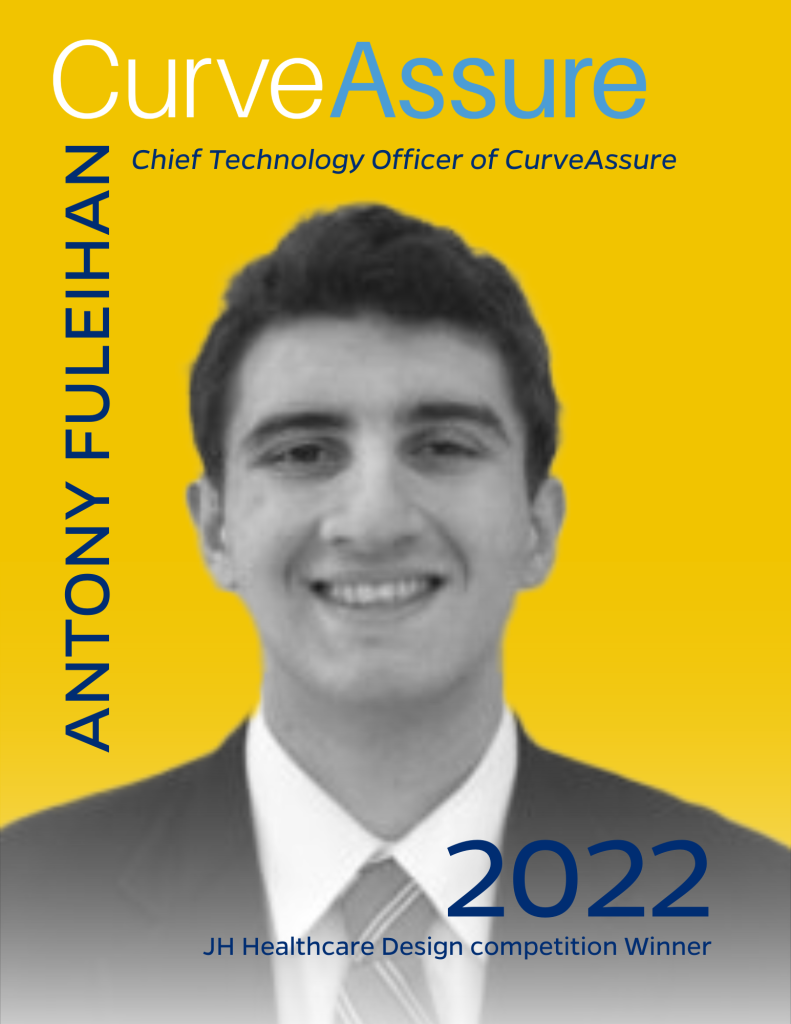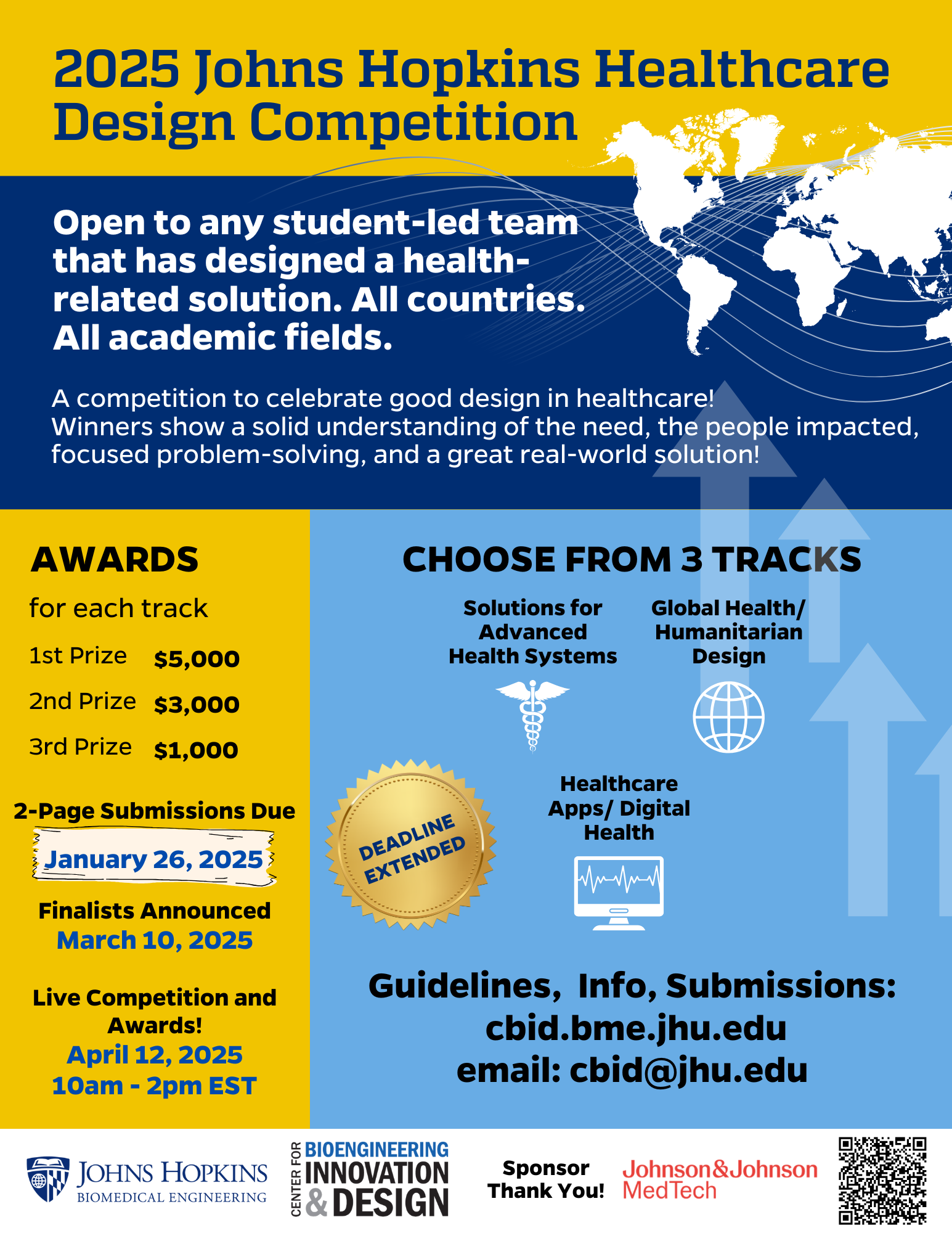2025 Johns Hopkins Healthcare Design Competition
Application
Timeline:
- January 26 – Submission of two-page proposals
- March 10 – Finalists informed
- April 12 – Final round (virtual event)
Competition Tracks:
- Designs of Solutions for Advanced Health Systems
- Global Health/ Humanitarian Design
- Healthcare Apps/ Digital Health
Eligibility for Application:
- Project must be focused on a healthcare application in either of the 4 tracks
- Designs of Solutions for Advanced Health Systems
- Global Health/ Humanitarian Design
- Healthcare Apps/ Digital Health
- Post-Surgical Infection Management
- Project must have been started after January 1st, 2023
- Project must be driven by full-time students
- Postdoc research projects are ineligible.
- Projects that have utilized significant funding (>$100K) are ineligible.
- Projects that are not run by full-time students are ineligible. For example, projects run by startup companies or faculty are ineligible.
- Eligible full-time students include those working towards undergraduate, masters, doctoral, and professional degrees (MBA, MD, etc.).
- Project teams should comprise of more than one full-time student.
- Applicants can submit multiple unique projects
If you have any questions regarding your team’s eligibility, please contact Aditya Polsani at [email protected] or Kunal Parikh at [email protected].
Simplified Rubric for Design Brief:
The Design Brief is a two-page executive summary of your design project. The brief should be written for an audience of medtech engineers and designers who may not be as familiar as you are with your clinical and solution space.
Content
Design Briefs will be evaluated by following four criteria. We recommend the design brief is laid out in sections devoted to each criteria.
- Problem description (25%)
- Define the problem you are addressing, the clinical/healthcare background, and why there is a need for a better solution.
- Solution concept(s) (25%)
- Present your proposed solution with your design rationale and explain how it meets the needs of the stakeholders involved in your clinical/healthcare problem.
- Reduction to practice (25%)
- Describe the proof-of-concept experimental results you have completed and/or renderings and photos of your prototype(s).
- Pathway to implementation (25%)
- Describe the pathway that lies ahead for your project towards creating an impactful solution.
Format
The Design Brief must be no more than 2 pages in length including figures. References can be listed as a separate page.
- Use an Arial, Helvetica, Palatino Linotype, or Georgia typeface, a black font color, and a font size of 11 points or larger. (A Symbol font may be used to insert Greek letters or special characters; the font size requirement still applies.)
- Type density, including characters and spaces, must be no more than 15 characters per inch. Type may be no more than six lines per inch. Use standard paper size (8 ½” x 11). Use at least one-half inch margins (top, bottom, left, and right) for all pages. No information should appear in the margins.
- Figures, plots, and/or photos are highly recommended but are counted towards the page limit.
- References can be included in a separate page and are not part of the two-page requirement
Questions? Please email [email protected], [email protected], or [email protected].
Judges
Your application will be reviewed by industry experts. You will be able to receive feedback on your application upon request.
2025 Judges










2023 Judges










Past Winners
Teams that have won our design competition have had major success following their win!

2025 Statistics & Winners
440+
teams applied
203+
universities participated
$27K
prize pool
9
winners
Winners of the Advanced Health Track:
1st Place: SinuStim – Johns Hopkins University – Sandhya Tiku, Oriol Cuxart
2nd Place: DialyLight – Columbia University – Angelina Mao, Laalitya Acharya, Luisa Aguilar, Ama Anwar, Luisanny Del Orbe, Rachel Jackson
3rd Place: MedNova – Purdue – Niharika Narra, Dean Stornello, Osi Okonkwo, Abigail Russell, Gianna Stinsa
Winners of the Global Health Track:
1st Place: OcuSound – Johns Hopkins University – Valerie Wong, Nancy Yan, Elliott Leow, Benjamin Miller, Maria Giannakopoulos, Ashish Nalla, Ivan-Alexander Kroumov, HyunSeo (Emily) Lee
2nd Place: AutoAspira – Johns Hopkins University – Neha Chellu, Moonhyung Lee, Ishir Sharma, Youran Li, Sangmita Singh, Derek Minn, Shreya Tiwari, Hassan Farah
3rd Place: GAITR – Columbia University – Lucia Martin, Mingying Yeoh, Maggie Nedbalek, Ratna Sharma, Sarah Liu, Jenny Fan
Winners of the Digital Health Track:
1st Place: NeoScreenix – Bangladesh University of Engineering and Technology – Mst. Fahmida Sultana Naznin, H.M. Shadman Tabib, Md. Hasnaen Adil, Sadatul Islam Sadi, Jannatul Ferdusy Saily
2nd Place: Ecoassist – Pontificia Universidad Católica del Perú – Nicole Doris Unsihuay Vila, Ana Cristina Angelita, Angulo Chávez, Franco Rozas Ortiz de Orue, José Miguel Otoya Barrios, Erick Alexander Valdivia Esteba
3rd Place: Kujali – Johns Hopkins University – Sidharth Raghavan, Samhith Bhrugubanda
To learn more about the 2025 JH Healthcare Design Competition winners, click here. To learn more about the 2025 JH Healthcare Design Competition finalists, click here.
2024 Statistics & Winners
280+
teams applied
123+
universities participated
$36K
prize pool
12
winners
Winners of the Advanced Health Track:
1st Place: Bloom Speculum – Clemson University – Vaishnavi Kanduri, Karen De Guzman, Elizabeth Dods, Angeline Chen
2nd Place: SNIFF – Johns Hopkins University – Felipe Andrade, Rosario Willat, Ignacio Moscoso, Javier Castro, Maximiliano Mariné
3rd Place: EndoGuard – Johns Hopkins University – Noah Lu, Gabriella Wong, Azmina Karukappadath, Aryaman Shodhan
Winners of the Global Health Track:
1st Place: Velocigraft – Johns Hopkins University – Ojas Chahal, Aarushi Pant, Jaeyoon Wang, Ashley Cluff, Dalhart Dobbs, Christine Wang, Aditya Shrinivasan, Paree Sharma, Thoya Raman
2nd Place: Team FetoSynth – Bangladesh University of Engineering and Technology (BUET) – Farihin Rahman, Sayeed Sajjad Razin, S.M. Sakeef Sani
3rd Place: OASIS – University of Pennsylvania – Sylvia Mihailescu, Srish Chenna, Kalen Truong, Kira Lu, Karan Shah
Winners of the Digital Health Track:
1st Place: NATAL CARES – Federal University of Technology Akure – Uche Udekwe, Joy Chioma, Gbenga Awe, Grace Balogun
2nd Place: DengueDrops – Bangladesh University of Engineering and Technology (BUET) – Mahian Kabir Joarder, A.S.M Anas Ferdous, S.M. Sakeef Sani
3rd Place: SmartTIVA – Johns Hopkins University – Juan Fernandez, Lina Betancur; Sara Orozco; Liceth Meneses
Winners of the Post-Surgical Infection Management Track:
1st Place: UroFlo – Rice University – Sahana Prasanna, Anushka Agarwal, Archit Chabbi, Robert Heeter, Kevin Li, Richard Chan
2nd Place: AquaShield – Universidad de Los Andes – Laura Laverde, Daniela Bernal, Ailin Prada, Camila Vargas
3rd Place: MicroSurge – University of Toronto – Shivam Sharma, Nandita Menon
To learn more about the 2024 JH Healthcare Design Competition winners, click here.
2023 Statistics & Winners
120+
teams applied
30+
universities participated
$22K
prize pool
6
winners
Winners of the Advanced Health Track:
1st Place: Sonura – University of Pennsylvania – Tifara Boyce, Gabriela Cano, Gabriella Daltoso, Sophie Ishiwari
2nd Place: PeriScope – Johns Hopkins University – Justin Opfermann
Winners of the Global Health Track:
1st Place: Team Test TSH – Rice University – Alison Maniace, Vanshika Jhonsa, Alex David, Margaret Li, Elise Erickson
2nd Place: Smile-geist – Bangladesh University of Engineering and Technology (BUET) – Atkia Atia, Md. Iftekharul Haque Fahim
Winners of the Digital Health Track:
1st Place: Korion Health – University of Pittsburgh – Anna Li, Akshaya Anand, Julia Dreifus, Joe Tharayil, Galen Kirkpatrick, Andrew Nguyen, Kailey Davies, Nick Chen, Nidhi Vedati, Amber James
2nd Place: Locaze – Johns Hopkins University – Sagar Rastogi, Kedar Krishnan, Emma Anderson, Siddhi Date, Ataes Aggarwal, Viraaj Reddi
To learn more about the 2023 JH Healthcare Design Competition winners, click here.
2022 Statistics & Winners
120+
teams applied
74+
universities participated
$22K
prize pool
6
winners
Winners of the Advanced Health Track:
1st Place: CurveAssure – Johns Hopkins University – Antony Fuleihan, Audrey Goo, Di Lu, Evan Haas
2nd Place: LymphaSense – Johns Hopkins University – Hunter Hutchinson, Jennifer Schultz, Lina Ngao, Benjamin Monteagudo, Zachary Plona
Winners of the Global Health Track:
1st Place: NovvaCup – Johns Hopkins University – Alexis Lowe, Danielle Nicklas, Andrew Mastellar, Clarissa Ren
2nd Place: Visilant – Johns Hopkins University – Kelsey Detels, Mary Hoopes, Niam Mohseni, Dema Shumeyko, Rohan Verma, Jordan Shuff
Winners of the Digital Health Track:
1st Place: GlucoClip – The American University In Cairo – Maha Shatta, Fatema Lokma Seif Shawkat Mostafa Nosseir Ahmed Elghoul
2nd Place: Moon Band – Brown University – Alexander Burt, Bhavik Rajaboina, Benjamin Plate
To learn more about the 2022 JH Healthcare Design Competition winners, click here.
2020 Statistics & Winners
212+
teams applied
174+
universities participated
$25K
prize pool
9
winners
Winners of the Advanced Health Track:
1st Place: OxyGen – Johns Hopkins University – Portable Mixed Flow Air-Oxygen Therapy
2nd Place: Emboguard – Duke University – Cerebral Protection for Transcatheter Aortic Valve Replacement (TAVR) Procedures
3rd Place: Neurosense – Massacusshets Institute of Technology – Surgical Innovation for Neural Interfacing
Winners of the Global Health Track:
1st Place: Oculy – Johns Hopkins University – Ocular Implant for the Sustained Release of Medication for Chronic Eye Disease
2nd Place: Cerviscope – Johns Hopkins University – A machine learning algorithm integrated with smartphone-based microscope technology to provide affordable, point-of-care screening for cervical cancer
3rd Place: Oxytech- Rice University – An Affordable Tool to Aid Biomedical Technicians with the Diagnosis and Repair of Broken Oxygen Concentrator Machines
Winners of the Digital Health Track:
1st Place: Wekebere – Makerere University – AI-powered device to ensure safer pregnancies
2nd Place: relieVR – University of Pennsylvania – A bioresponsive virtual reality system for the treatment of pediatric Lower Urinary Tract Dysfunction
3rd Place: Medi-Assess – IIT BHU – Optimizing Emergency Management to decrease preventive deaths in Low Resource and Overcrowded Settings
To learn more about the 2020 JH Healthcare Design Competition winners, click here.
Advice

Be Honest and Have Fun
On pitch day, my team looked at some presentations and we realized we didn’t have a business plan. So, we decided it would just be a good experience no matter what. Everyone was pitching their devices as startups, meanwhile we had no business plan at all.
We said, “listen, we’ve seen a lot of business pitches today and we just want to be upfront: we thought of this as a design competition since we have backgrounds in design and BME, but none of us are in business at all.” Then, we were shocked to find we won the competition.
At the end of the day, focus on having a good product and experience with your team.

Leverage Your
Resources as a Student
My #1 tip for students is always to pull your student card for as long as possible. Take advantage of all of the academic resources from your home institution, including physical resources like your student library, access to research papers, and design competition funding.
Also take advantage of the network of people around you who will help you
along the way. If you’re reaching out to industry experts, pull the student card
and say “I’m working on this school project, do you have a few minutes to tell me about your job,” and almost anyone will be willing to talk about themselves with you. This way, you will get more information and feedback. People who are a part of these early conversations will be your initial customers if you stay in touch.
You have no idea how many resources are at your fingertips as a student, until you’re no longer a student.

Practice,
Practice, Practice
A key piece of advice that I can give is to make sure that you practice your pitch in front of different audiences. Transitioning from a deeply technical concept to a pitch is challenging, and there are a
lot of great ways to improve your presentation style. More often than not, you might get too lost in the narrow, finite
details and obscure the bigger picture. Practice in front of mentors, advisors,
other students, and your family! Getting feedback from a bunch of sources with
variable levels of expertise can really help refine the final product and presentation.
Another critical element is your passion for healthcare. Make sure that you clearly articulate the unmet clinical
need and the true value proposition to patients and the healthcare system.
Ultimately, this is a healthcare design competition and what matters most is the impact you can have on medicine.



